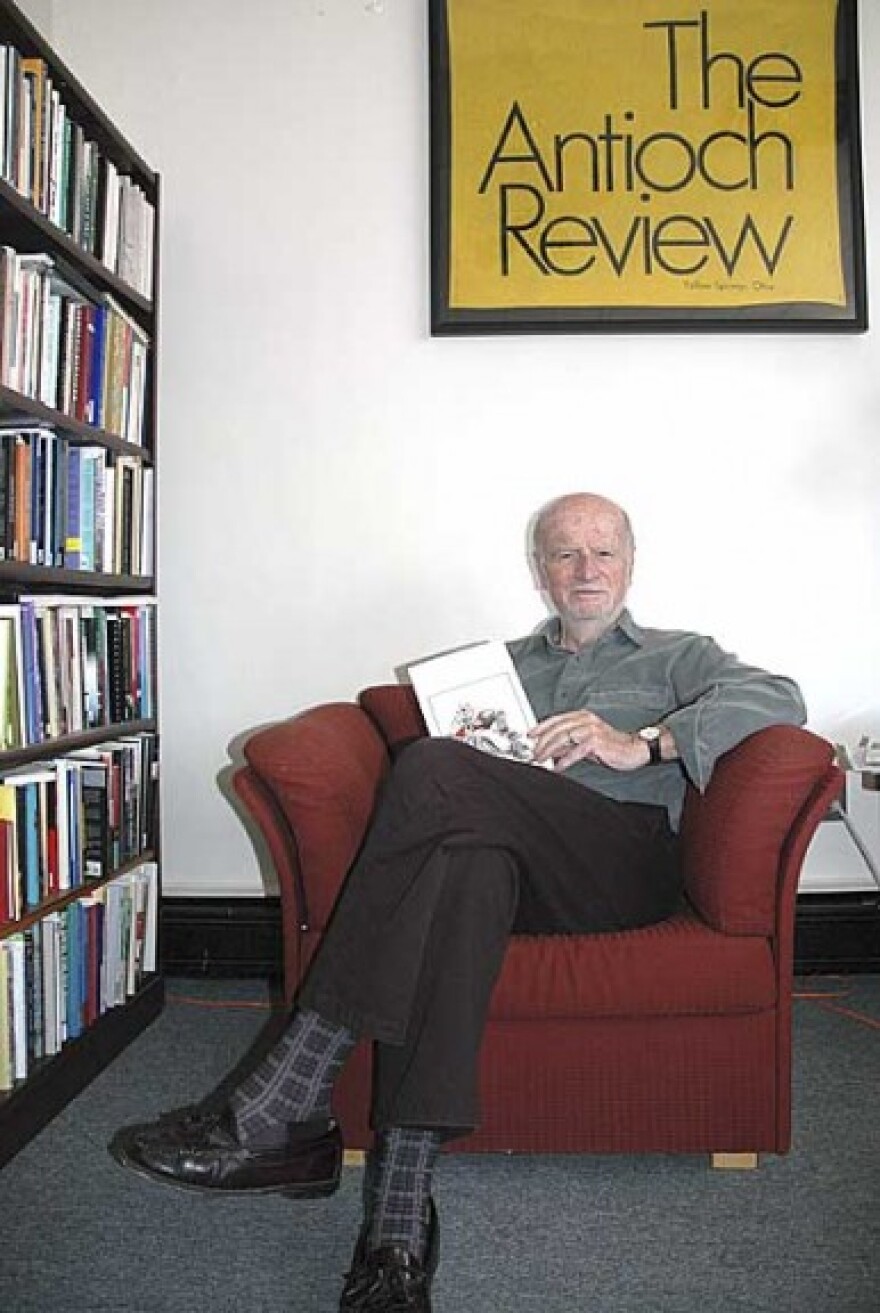Robert Fogarty, the editor of the Antioch Review for over 40 years passed away recently. Antioch professors started The Review in 1941 to publish essays in the social sciences. When Fogarty took over in the 1970’s he almost single-handedly built the Review’s reputation as a great literary magazine that rivaled The New Yorker.
Bob Fogarty grew up in his dad’s bar in Brooklyn. So he knew how to talk to people and tell a good story.
Scott Sanders, archivist for Antioch College, recalls Fogarty telling him about his early life and one summer when Fogarty worked building skyscrapers. “And so he was up, you know, many, many floors, 300 feet in the air, and I was like, “What are you doing up there?” I mean it was kind of like my thought. That the guys he worked with on the skyscrapers always wanted to know what he was reading because he always had a book that he read throughout his lunch break.”
Fogarty read everything, and in college, he grew fascinated with the history of communes and planned communities. This deep interest lasted his entire academic career. He wrote 10 books on communes and their ways of living and was widely regarded as an expert.
“When a commune blew itself up,” says Sanders, “he was always contacted by the press for an expert word on what happened in Waco or what happened to the Hale Bopp comet people. You kind of wonder how you can keep your sanity studying outfits like this. But he understood these cultures.”

At Antioch, Fogarty taught history, but he also was known for a surprising course in the English department: a class on second rate literature. He wanted students to consider what makes for quality writing. Then Fogarty took over the helm of the Antioch Review.
Fogarty described his editorial style on a Book Nook episode from the 75th anniversary of the Review in 2017.
“If I have any editorial philosophy,” Fogarty said, “I like to surprise people, the writer has to make the reader turn the page. The reader wants to know what’s going to happen next. And if I can figure out in advance how a story is going to end, I probably won’t accept it.”
Over the years, Fogarty published some famous writers like Raymond Carver and T.C. Boyle, but he prided himself on doing what larger magazines no longer do—read unsolicited manuscripts, hundreds each year. Publishers call them the slush pile.
“But we continue to read the slush,” remarked Fogarty. “You’d be surprised at what you might find. We get essays and stories from people in jail. And there’s only one I can remember having published was a guy who ran a projection screen at a prison. And he was objecting that the prisoners had rather bad taste, and that they didn’t appreciate the films that they were watching. And they would walk out at a certain period of time. And I thought it was quite interesting to get the insight of somebody who is, you know, in jail and likes films and wants to show them etc. And that came out of the slush.”
Fogarty never gave way to trends in the literary world, even as he managed to keep the magazine current. He always stuck up for the writers he would choose to publish. He provided the example of Edith Perlman whom he claimed as a “wonderful short story writer.”

"And we’ve published her work pretty steadily,” Fogarty recalled, “so much so that a literary friend of mine suggested that I ought to change the name of the magazine to the Edith Perlman Review."
“And when she was finally discovered five years ago, Fogarty went on, “the reviewer for the front page article in the New York Times Book Review section said, 'Why haven’t we heard of her?' And I thought, 'Well, you have been reading in the wrong places.' Maybe a writer has one story in them, literally one story, and they don’t have anything else. Well, you should publish the one story if it’s really good.”
Now the fate of the Antioch Review is unknown. Fogarty did not designate a successor to take over the magazine after his passing. Scott Sanders, longtime colleague and friend view the future of the magazine this way: “In my mind, if Bob was the last editor of the Antioch Review, in a way that’s not such a bad thing. But to have ended with it’s greatest editor. I mean, how do you replace him?”
Bob Fogarty died in August.
Support for Culture Couch comes from WYSO Leaders Frank Scenna and Heather Bailey, who are proud to support storytelling that sparks curiosity, highlights creativity and builds community.
Culture Couch is created at the Eichelberger Center for Community Voices at WYSO.


